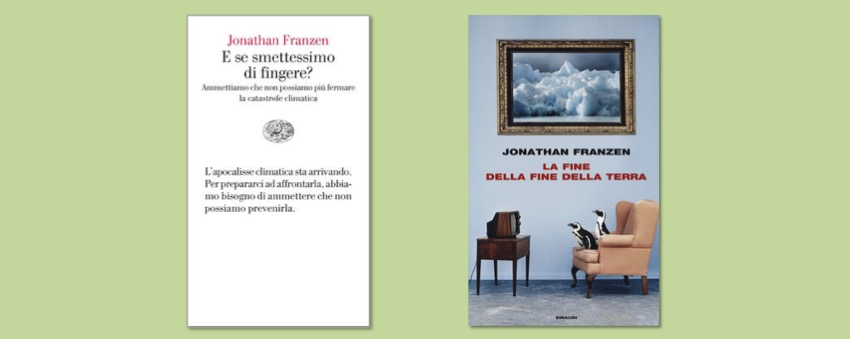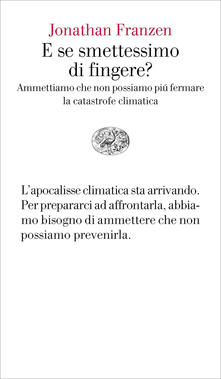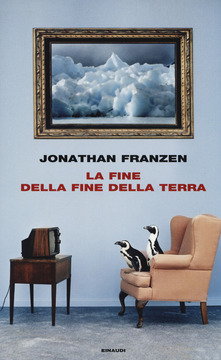
I dedicate the month of March to Jonathan Franzen, American writer and essayist, author of novels and writings that he regularly publishes in “The New Yorker” and “Harper’s”. A short essay and a collection of writings in which his way of being an environmentalist is expressed: without dogma and with a great sense of reality.
Probably for the month that starts spring we would prefer advice on more colorful and chirping books, but right now that we still have a spring that overwhelms us with flowers and a sky that sees flocks in motion, we must look around to interpret the signs of the apocalypse. climatic coming soon. Franzen’s two books, without dramatic tones, help us find a way to decipher the complexity of the world in which we live, to seek the key to our responsibilities, to decide how to deal with the contingent.

Pagine: 64, Brossura | EAN: 9788806246907
In this short and brilliant essay, Jonathan Franzen, who has been following the events of climate change for at least thirty years, contemplates the possibility that the climate apocalypse will occur in his lifetime.
As a passionate environmentalist, Franzen is frustrated that climate change, in a futile way, monopolizes public debate, as the climate apocalypse has exploded since at least 2015. In this essay, he speaks from the heart and tries to answer some of the questions that had been addressed to him on previous articles and essays, first of all: isn’t it politically counterproductive to take away hope from people? “Given the gravity of the situation, the problem of hope is decisive and authentic hope requires sincerity and love. Sincerity because hope is an investment like any other, which is best done with eyes wide open. And love because , without love, there is no hope that is worth cultivating. “

Pages: 216, Hardcover| EAN: 9788806240271
A collection of sixteen texts that, thanks to his masterful writing, help to explore, understand and illustrate complexity. Texts which, while touching on a multiplicity of topics, are linked by an evident red thread in which the author’s stubborn desire not only to understand the world around him but to change it for the better, even when everything seems to indicate that that world is racing towards the apocalypse. “And so, with his always calm and meditated style, with his always shy and restrained approach, Franzen ends up pushing himself” to the end of the earth “, for example by making friends with one of the most radical and intractable American writers of recent decades, William Vollmann, of whom an unforgettable portrait is provided in these pages, or by placing himself on the deck of a ship bound for Antarctica, “exposed to the biting wind and brackish spray, gazing into the fog or dazzling light”, in hope to catch a glimpse of an emperor penguin. Because, as the title of one of the most heartfelt of these sages states, “birds are important.” In fact, birds, whether it be a hummingbird flying across the Gulf of Mexico, a hawk a pilgrim who dives in a dive at three hundred and sixty kilometers per hour, or an albatross hovering alone hundreds of miles from any other member of its species, do “what we would all like to know how to do it, but we can only do it in a dream ». A bit like literature. “(From the synopsis in the dust jacket)
Credits
Author: Anna Lacci is a scientific popularizer and expert in environmental education and sustainability and in territory teaching. She is the author of documentaries and naturalistic books, notebooks and interdisciplinary teaching aids and multimedia information materials.
Translation by Maria Antonietta Sessa


